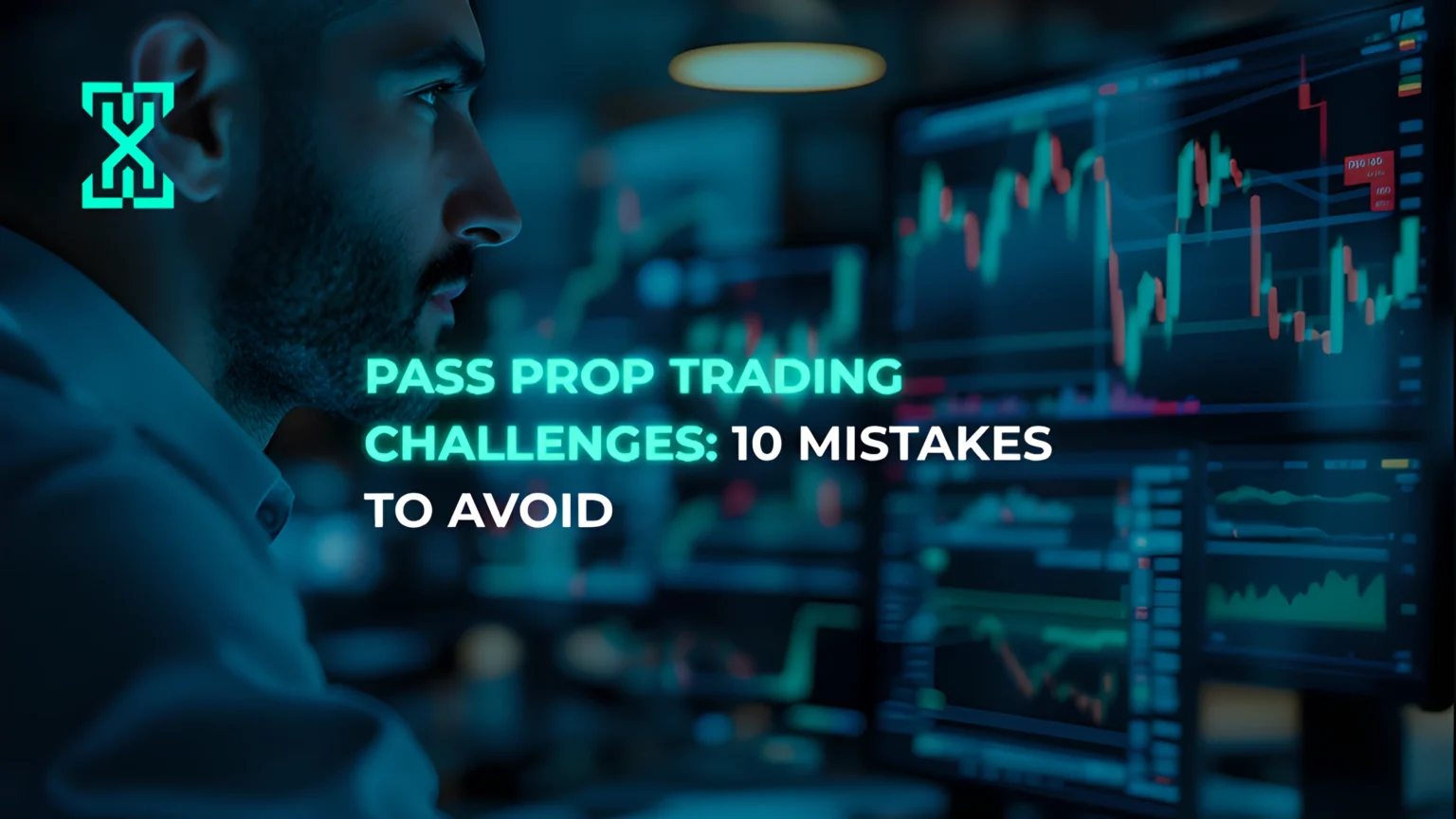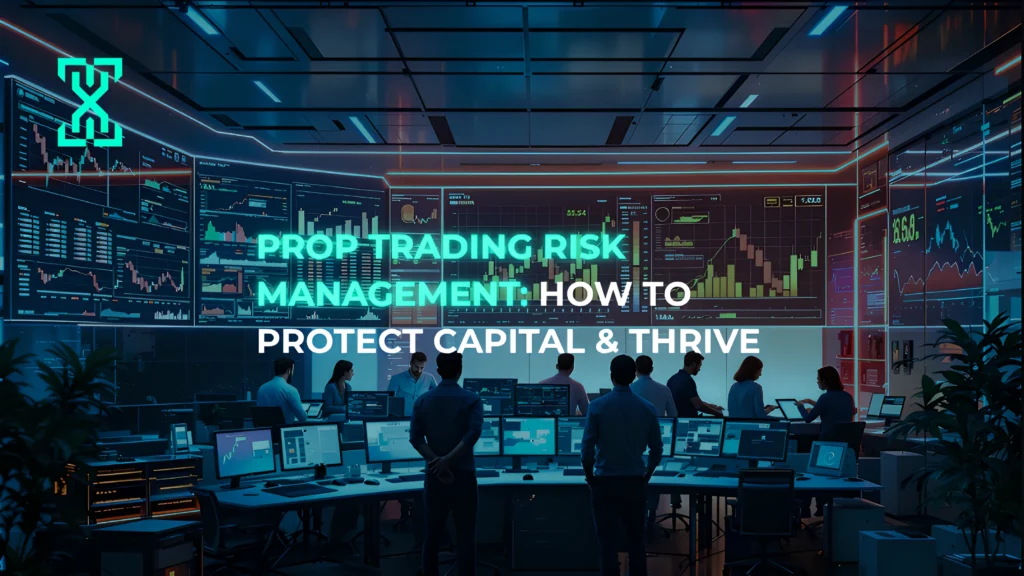Pass Prop Trading Challenges: 10 Mistakes to Avoid

Passing a prop trading challenge isn’t about flawless strategy; it’s about discipline, structure, and emotional control. Most traders fail not because they lack technical skills but because they fall into predictable pitfalls – overleveraging, emotional trading, ignoring rules, or trading without a plan. These mistakes cost traders funded accounts before they even get started.
In this article, we’ll break down the top 10 mistakes that make traders fail prop firm challenges. You’ll gain insight into what trips people up, from poor risk management to diary neglect, and learn how to avoid these traps using smart frameworks and psychological awareness. We’ll also provide examples and expert-backed tips to help you develop the mindset and habits of consistently successful funded traders. Whether it’s your first challenge or your tenth, this guide arms you with clarity, structure, and resilience. Let’s get into it.
Top 10 Mistakes That Make Traders Fail Prop Firm Challenges
1. Ignoring Challenge Rules & Guidelines
Prop firms expect traders to follow strict rules – daily drawdown limits, news restrictions, minimum trading days. Violating a rule can instantly disqualify you.
Solution: Print the rulebook, highlight critical clauses, and place it next to your screen. Never trade without refreshing your understanding before each session.
2. Trading Without a Structured Plan
Without a pre-defined trading plan, you drift emotionally and inconsistently. Researchers call plan-based trading a cornerstone of discipline.
Solution: Write down your strategy, entry/exit rules, and risk limits. Commit to “only trade what your plan dictates,” guiding with discipline – not impulse.
3. Poor Risk Management & Over-Leveraging
Ignoring stop-losses, risking >2% per trade, or using excessive leverage is one of the quickest ways to fail. A study advises prudent money management as the key differentiator between amateurs and pros. Investopedia. Prop traders should risk 0.5-1% per trade at most.
Solution: Always calculate maximum risk per trade based on drawdown limits. Automate stop-loss entries and never override them.
4. Overtrading
Trading too often – especially out of fear or emotion – leads to poor setups and blown accounts. “Overtrading is the number one account killer,” wrote a Reddit trader. Reddit.
Solution: Limit daily trades (2–3 max) and only act on high-quality setups. Review your performance, not just action.
5. Emotional & Revenge Trading
Letting emotions like greed or frustration guide decisions is perilous. This includes revenge trading after a loss. Jeff Sussin emphasized the destructive power of behavioral bias like regret and overconfidence. Investopedia. Emotional trading is a core failure mode.
Solution: Take breaks after losses. Use journal prompts to pause and recalibrate your mindset before resuming.
6. Unrealistic Expectations & Impatience
Many traders want fast funding, but prop challenges are endurance tests. Unrealistic expectations set you up for failure.
Solution: Focus on consistency over speed. Pace yourself and grow steadily rather than jump.
7. Inconsistent Strategies & Style Switching
Jumping from scalping to swing during a challenge dilutes your edge. Inconsistency kills results.
Solution: Stick to one proven approach. If it’s working, reinforce it; if not, pause and recalibrate—don’t flip mid-challenge.
8. Skipping Trade Review & Journaling
Ignoring education from your own mistakes stunts growth. Without reviewing trades, you repeat errors unknowingly.
Solution: Keep a journal with screenshots, entries, emotional state notes. Review weekly to identify patterns and improve.
9. Failing to Adapt to Market Conditions
Rigid strategies fracture under changing market regimes. A trend-following method fails in a consolidation, and vice versa.
Solution: Monitor market context. Have alternate methods or tighten risk when regime shifts occur.
10. Neglecting Psychological Prep
Your mindset is more powerful than your system. Pressure, stress, or lack of focus can derail decisions—even when your plan is sound. Investopedia+1
Solution: Develop a pre-trade mindset routine – meditation, clarity check, or affirmations. Journal your thoughts and adjust based on your emotional performance.
Quick Takeaways
- Read and adhere to challenge rules – ignorance disqualifies instantly.
- Trade with a plan and strict risk rules (≤1% per trade).
- Avoid trading emotionally – overtrading and revenge are bottomless traps.
- Journal and review trades regularly to learn and optimize.
- Adapt to market context and build mental fitness for challenge stress.
FAQs
- What’s the ideal risk per trade in prop challenges?
Stick to 0.5-1% per trade, always using stop-losses to protect against disqualification. - How many trades should I take per day?
No more than 2-3 well-structured trades; discipline beats desperation. - Is journaling necessary?
Yes. It creates a feedback loop to learn from mistakes and refine your approach. - How do I handle emotional trading pressure?
Use pre-trade routines like breathwork or quick mindfulness, enter trades only when emotionally neutral. - Can adapting strategies mid-challenge help?
Only if it’s done methodically. Otherwise, consistency is key. Adapt slowly, not impulsively.
Conclusion
Prop trading challenges are far more than just profit goals – they’re assessments of your discipline, risk mindset, and psychological stamina. Traders fail, not because they lack strategy, but because they breach rules, overtrade, or lose emotional control. The ten pitfalls we’ve covered – from ignoring guidelines to skipping journaling – are avoidable when you operate with structure, mental awareness, and integrity.
Success in prop trading isn’t about flashy trades or beating the market. It’s about consistency, self-awareness, and disciplined execution under pressure. You can control your process, even when markets and emotions fluctuate. If you commit to trade with intention – and learn from mistakes rather than repeating them – you stand a much better chance not only of passing a challenge but thriving once funded.
Ready to level up? Use a printed checklist of this article while trading your next challenge. Share your results with our team or community, and remember: trade the process first – profits follow.
Our Latest Stories
Trade Less, Earn More: Prop Trading Smarter, Not Harder
Do you feel like you have to trade every day just to…
Prop Trading Risk Management: How to Protect Capital & Thrive
Welcome, online traders! If you’re venturing into prop trading, mastering risk management…
Stay Informed,
Stay Ahead
Bookmark this blog to keep your edge sharp. Whether you're prepping for your first challenge or scaling into a six-figure funded account, our insights are here to help.


